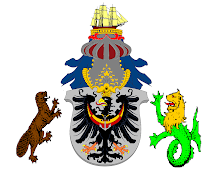Albrecht’s first chore was to organize the Duchy along both civilian and military lines. To facilitate his plan for a parliamentarian body, he divided the Duchy into five Counties (Grafschafts), each under the rule of a Graf. A representative of each town (Stadt) was sent to the capital at Splitzfluss to join the UnterHaus of the Parliament, while the five Grafs would form the OberesHaus. In times of war or emergency, each Graf would declare martial law and command military forces from their Grafschaft.
Since the reason for Albrecht’s rise to power had been frequent incursions, he saw the need to secure the borders from both raiders and the prying eyes of potential enemies. Albrecht also wanted to keep his initial activities from the Emperor’s notice, If His Majesty realized how extensive were changes being wrought in the new Duchy, he might reconsider his choice of ruler.
He instituted a mounted police force, his FieldJagerKorps, to bring centralized law and order, conduct border patrols, and ensure the collection of taxes. In peacetime, the Korps formed a national force to enforce and administer justice. In time of war, the entire Korps would muster at the capital, and held the title of senior regiment of light cavalry.
Herzog Albrecht sent his agents out to recruit carefully selected, experienced and proven military men for appointment to his civil/military staff. Among several capable and opportunistic officers who responded to the duke’s summons was a famous veteran of many campaigns, the Graf von Grunt!
Since the reason for Albrecht’s rise to power had been frequent incursions, he saw the need to secure the borders from both raiders and the prying eyes of potential enemies. Albrecht also wanted to keep his initial activities from the Emperor’s notice, If His Majesty realized how extensive were changes being wrought in the new Duchy, he might reconsider his choice of ruler.
He instituted a mounted police force, his FieldJagerKorps, to bring centralized law and order, conduct border patrols, and ensure the collection of taxes. In peacetime, the Korps formed a national force to enforce and administer justice. In time of war, the entire Korps would muster at the capital, and held the title of senior regiment of light cavalry.
Herzog Albrecht sent his agents out to recruit carefully selected, experienced and proven military men for appointment to his civil/military staff. Among several capable and opportunistic officers who responded to the duke’s summons was a famous veteran of many campaigns, the Graf von Grunt!

Albrecht immediately appointed the gristly Graf his Adjutant General and leader of Splitzfluss Grafschaft.
Albrecht then called for a reorganization and expansion of military force. He increased some of the corporate Grenzer companies and squadrons to regimental strength, added an artillery arm to the standing force, and began negotiation with other countries to augment the army when necessary with mercenary units. As a result, in short order he had a workable Corps-sized army.
Albrecht then called for a reorganization and expansion of military force. He increased some of the corporate Grenzer companies and squadrons to regimental strength, added an artillery arm to the standing force, and began negotiation with other countries to augment the army when necessary with mercenary units. As a result, in short order he had a workable Corps-sized army.

No comments:
Post a Comment